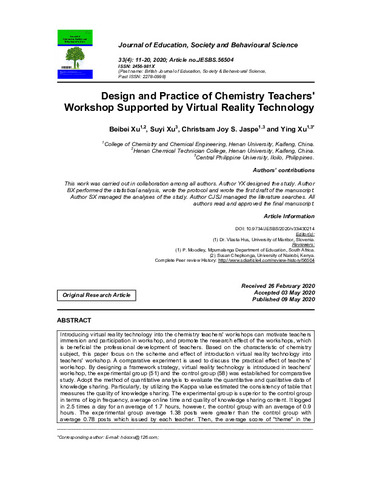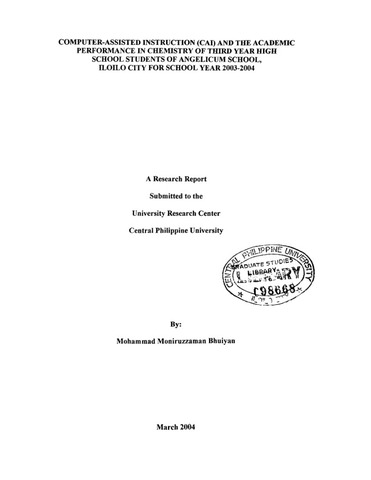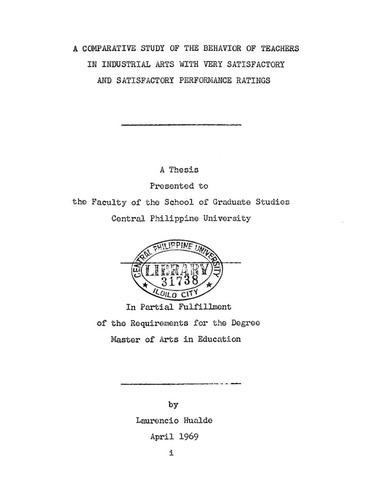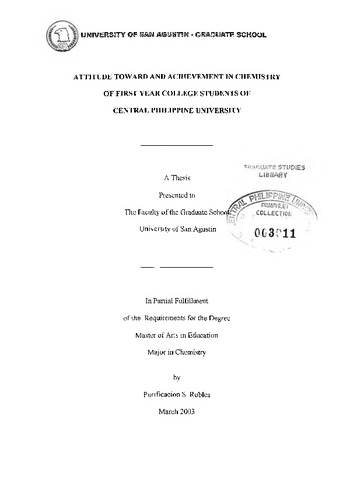Design and practice of chemistry teachers' workshop supported by virtual reality technology
| dc.contributor.author | Xu, Beibei | |
| dc.contributor.author | Xu, Suyi | |
| dc.contributor.author | Xu, Ying | |
| dc.contributor.author | Jaspe, Christsam Joy S. | |
| dc.date.accessioned | 2022-03-29T08:22:27Z | |
| dc.date.available | 2022-03-29T08:22:27Z | |
| dc.date.issued | 2020-05-09 | |
| dc.identifier.citation | Xu, B. , Xu, S. , Jaspe, C. J. S. , & Xu, Y. (2020). Design and practice of chemistry teachers' workshop supported by virtual reality technology. Journal of Education, Society and Behavioural Science, 33(4), 11-20. | en_US |
| dc.identifier.issn | 2456-981X | |
| dc.identifier.uri | https://hdl.handle.net/20.500.12852/2011 | |
| dc.description | Journal article | en_US |
| dc.description.abstract | Introducing virtual reality technology into the chemistry teachers' workshops can motivate teachers immersion and participation in workshop, and promote the research effect of the workshops, which is beneficial the professional development of teachers. Based on the characteristic of chemistry subject, this paper focus on the scheme and effect of introduction virtual reality technology into teachers' workshop. A comparative experiment is used to discuss the practical effect of teachers' workshop. By designing a framework strategy, virtual reality technology is introduced in teachers' workshop, the experimental group (51) and the control group (58) was established for comparative study. Adopt the method of quantitative analysis to evaluate the quantitative and qualitative data of knowledge sharing. Particularly, by utilizing the Kappa value estimated the consistency of table that measures the quality of knowledge sharing. The experimental group is superior to the control group in terms of login frequency, average online time and quality of knowledge sharing content. It logged in 2.5 times a day for an average of 1.7 hours, however, the control group with an average of 0.9 hours. The experimental group average 1.38 posts were greater than the control group with average 0.78 posts which issued by each teacher. Then, the average score of "theme" in the experimental group was higher than the experimental group about 1.7344 point, in the quality of knowledge sharing. And, the average score of contribution in the experimental group was higher than the control group too. The experimental results show that the introduction of virtual reality technology in the workshop can effectively improve the enthusiasm and participation of teachers, the teachers' research effect in this designed workshop also was increased significantly. | en_US |
| dc.language.iso | en | en_US |
| dc.publisher | Journal of Education, Society and Behavioural Science | en_US |
| dc.relation.uri | https://www.journaljesbs.com/index.php/JESBS/article/download/30214/56693/ | en_US |
| dc.rights | Attribution 3.0 Philippines | * |
| dc.rights.uri | http://creativecommons.org/licenses/by/3.0/ph/ | * |
| dc.subject.lcsh | Virtual reality | en_US |
| dc.subject.lcsh | Virtual reality in education | en_US |
| dc.subject.lcsh | Teaching--Aids and devices | en_US |
| dc.subject.lcsh | Teaching--Aids and devices--Evaluation | en_US |
| dc.subject.lcsh | Chemistry teachers | en_US |
| dc.subject.lcsh | Chemistry teachers--Training of | en_US |
| dc.subject.lcsh | Career development | en_US |
| dc.subject.lcsh | Chemistry--Study and teaching | en_US |
| dc.title | Design and practice of chemistry teachers' workshop supported by virtual reality technology | en_US |
| dc.type | Article | en_US |
| dcterms.accessRights | Publicly accessible | en_US |
| dc.citation.firstpage | 11 | en_US |
| dc.citation.lastpage | 20 | en_US |
| dc.citation.journaltitle | Journal of Education, Society and Behavioural Science | en_US |
| dc.citation.volume | 33 | en_US |
| dc.citation.issue | 4 | en_US |
| local.subject | Virtual reality technology | en_US |
| local.subject | Chemistry teachers' workshop | en_US |
| local.subject | Virtual experiment | en_US |
| local.subject | Teacher professional development | en_US |
| local.subject | Knowledge sharing | en_US |
| dc.identifier.doi | 10.9734/jesbs/2020/v33i430214 |
Fichier(s) constituant ce document
Ce document figure dans la(les) collection(s) suivante(s)
-
Journal articles [7]






